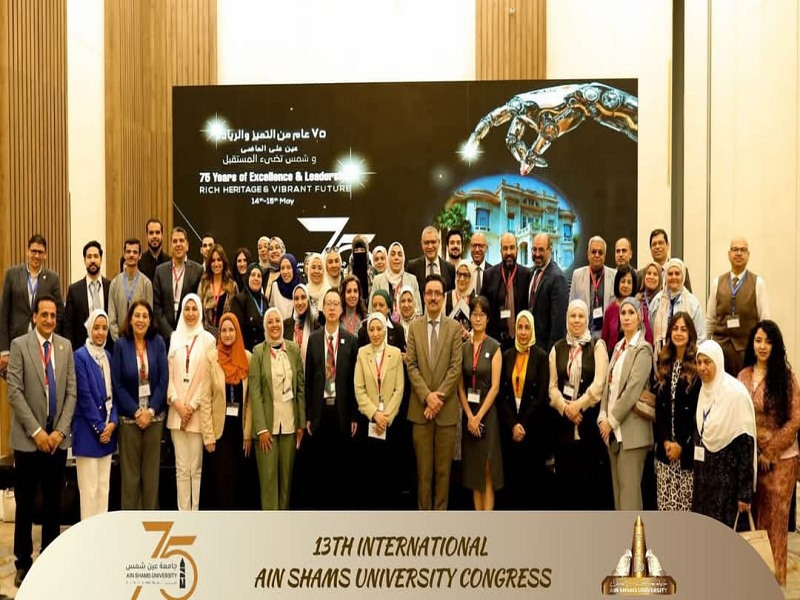The launch of the third annual conference of the Measurement and Evaluation Scientific Association (MESA) under the title “Educational Quality Practices: Innovative Paths to Excellence”
Under the patronage of Prof. Amr Ezzat Salama, Secretary-General of the Association of Arab Universities, and Prof. Mohamed Diaa Zain El-Abedeen, President of Ain Shams University, and chaired by Professor Dr. Mona Abdel-Aal El-Zahry, Secretary-General of the Scientific Society for Measurement and Evaluation and Director of the Center for Development of Educational Strategies and Research at Ain Shams University, and on the sidelines of the 13th International Conference of Ain Shams University, the Scientific Society for Measurement and Evaluation, affiliated with the Association of Arab Universities, in cooperation with the Egyptian Center of the International Institute for Distance Education (IIOE Egypt) affiliated with UNESCO-ICHEI, organized its third scientific conference for the university under the title: "Quality Practices in Education: Innovative Pathways to Excellence."
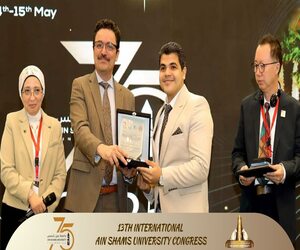 |
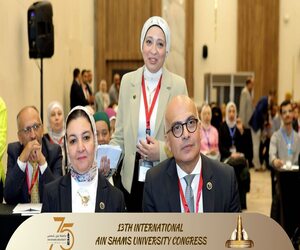 |
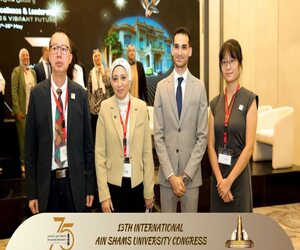 |
||
The conference seeks to bring together educational thought leaders, researchers, policymakers, and technology experts from around the world to explore innovative strategies for inclusive, equitable, and high-quality education. This pioneering event is jointly organized by the Measurement and Evaluation Scientific Association (MESA) and the Egyptian Center for the International Institute for Distance Education (IIDE EGYPT) as part of a shared commitment to "connect innovative educational methodologies, validated assessment frameworks, and digital solutions to address contemporary education challenges." Building on the success of previous editions, the conference aims to promote dialogue within a framework aligned with the United Nations Sustainable Development Goal 4 (Quality Education), Egypt's Vision 2030, and the requirements of advanced learning in the 21st century. The conference provides a unique platform for knowledge exchange and the presentation of innovative solutions that contribute to a radical transformation of educational systems locally, regionally, and globally.
The conference aims to foster innovation by showcasing the latest tools, methodologies, and policies driving educational excellence, enhancing assessment practices, promoting data-driven assessment techniques to improve learning outcomes and ensure accountability, and encouraging collaboration by connecting stakeholders across various sectors to share best practices and design scalable solutions. This, in turn, enhances educational quality and highlights appropriate strategies for ensuring high-quality education.
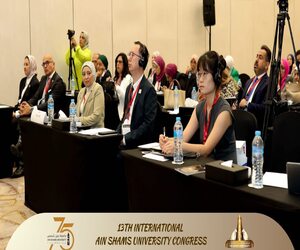 |
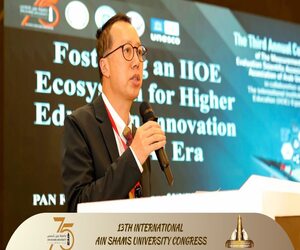 |
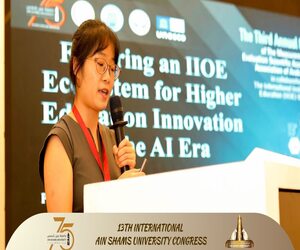 |
||
In his address to the conference participants, University President Mohamed Diaa Zain El Abedeen emphasized that quality education represents the cornerstone of achieving the Sustainable Development Goals. It is the foundation for building societies and advancing nations. Without high-quality education, countries will be unable to unleash the potential of their people or achieve the desired economic and social growth.
His Excellency added that this is what the university has been striving for 75 years, adhering to its vision of global leadership in education and scientific research, and the production and investment of knowledge through a system that supports innovation and achieves sustainable development. This vision is also closely aligned with Egypt's 2030 Strategy, of which innovative, world-class education is one of its most important pillars.
He pointed to the importance of measurement and evaluation as a pivotal tool for ensuring the quality of the educational process, assessing learning outcomes, and striving for continuous improvement.
He explained that the rapid developments in the field of artificial intelligence are impacting all aspects of life, including education. However, we also recognize that artificial intelligence is a double-edged sword that requires wise and responsible use, while preserving ethical and educational values. He highlighted the importance of cooperation between Egyptian universities, faculty members, and policymakers to ensure effective governance of artificial intelligence in education.
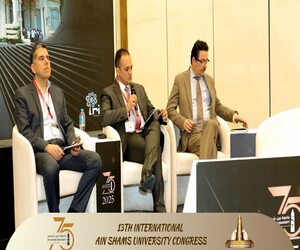 |
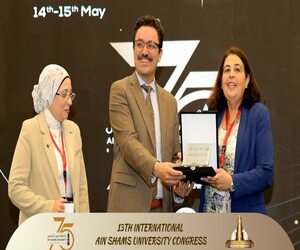 |
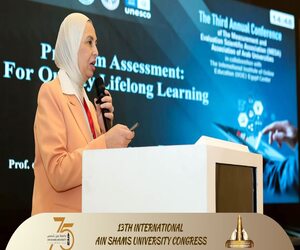 |
||
Prof. Mona Abdel-Aal El-Zahry, Director of the Center for Educational Strategies and Research at Ain Shams University, stated during the opening of the third annual conference of the Scientific Society for Measurement and Evaluation, held in cooperation with the Association of Arab Universities and the Egyptian Center for the International Institute for Distance Learning, that the conference is a distinguished scientific platform bringing together a group of researchers and experts to discuss fundamental issues related to the quality of education and explore new horizons for excellence through modern practices and technologies that contribute to the development of education systems at all levels. The choice of this title did not come out of nowhere, but rather reflects our deep belief in the importance of quality in education as a fundamental pillar for achieving sustainable development, investing in human capital, and keeping pace with the rapid global changes witnessed by educational systems in the era of digital transformation and the Fourth Industrial Revolution. We are open to innovative visions and approaches that place the learner at the heart of the educational process and establish high-quality, fair, comprehensive, and flexible education. Here, the role of measurement and evaluation emerges as a vital tool for improving performance, ensuring outcomes, and achieving educational justice. She explained that the scientific conference represents a sophisticated intellectual platform where we meet to exchange experiences, review the latest Arab and international practices and experiences in the field of educational quality, and explore prospects for institutional and academic excellence. We hope that the recommendations emerging from the conference sessions will constitute a new roadmap toward Arab education capable of competition, creativity, and innovation.
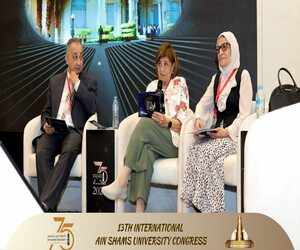 |
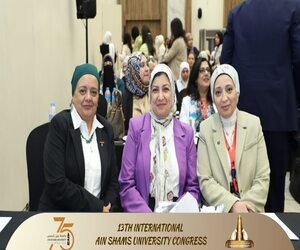 |
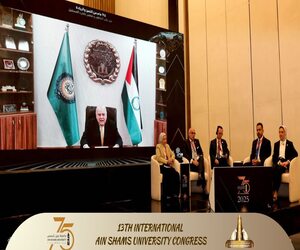 |
||
In conclusion, Her Excellency extended her sincere thanks and appreciation to Ain Shams University for hosting the conference, and to everyone who contributed to the preparation and organization of this distinguished scientific event, as well as to everyone who contributed to the success of this important scientific event. She also expressed her gratitude to all the researchers, experts, and participants who enriched the conference with their insightful ideas and visions. We hope that the research papers, scientific contributions, and recommendations will contribute to supporting decision-makers, promoting a culture of quality, and advancing the educational landscape in our Arab world.
Prof. Jin Li, Director of the UNESCO ICHEI Center and Vice President of the Southern University of Science and Technology, China, noted that I helped him participate in this important scientific conference, which reflects the commitment of Arab academic institutions to developing measurement and evaluation systems as part of global efforts to improve the quality of education.
He explained that partnerships between universities and international organizations such as UNESCO represent a vital bridge for exchanging expertise and promoting innovation in education. He believes in the importance of cross-border cooperation in developing assessment tools that reflect efficiency and fairness and support sustainable development.
In conclusion, he thanked Ain Shams University, in cooperation with the Scientific Society for Measurement and Evaluation, for their kind invitation and looked forward to further fruitful cooperation in the future.
Professor Amr Ezzat Salama, Secretary-General of the Association of Arab Universities, expressed his pleasure at participating in the third annual conference of the Scientific Society for Measurement and Evaluation, which is one of the most prominent Arab academic forums aimed at developing educational measurement and evaluation mechanisms as a key approach to improving the quality of educational outcomes and keeping pace with contemporary challenges.
In his opening remarks, Salama emphasized that the global technological acceleration has transformed measurement and evaluation processes from an "academic luxury" to an urgent and indispensable necessity, especially in light of the need to emulate qualitative developments in curricula and educational environments. He explained that the conference constitutes a vital platform for exchanging experiences and presenting innovative solutions, noting that ensuring academic fairness and competitiveness among educational institutions is directly linked to the effectiveness and transparency of measurement tools.
He pointed out that the Federation supports initiatives aimed at developing higher education and scientific research in the Arab world, considering measurement and evaluation to be the "backbone" of achieving institutional and programmatic accreditation and enhancing community confidence in educational outcomes.
In concluding his remarks, Salama praised the exceptional efforts of the Scientific Association for Measurement and Evaluation in organizing the conference, expressing his hope that its recommendations will be translated into practical measures that strengthen Arab educational systems and accelerate their alignment with the developments of the digital age, in line with the 2030 Sustainable Development Goals.
The first session addressed "Linking Quality Education to Effective Evaluation," noting that linking quality education with effective values is one of the fundamental pillars of building advanced and sustainable societies. Quality education is not limited to transferring knowledge and skills alone, but also contributes to instilling positive values such as responsibility, respect, integrity, and cooperation. When these values are integrated into the educational system, they enhance the effectiveness of the educational process and contribute to the development of individuals capable of critical thinking and making ethical decisions that serve the public good. Therefore, the true quality of education is measured by its ability to prepare an educated generation committed to values that contribute to the development of the nation and its people.
The session was chaired by Prof. Nadia Badrawi, President of the Arab Network for Quality Assurance in Higher Education (ANQAHE), and Prof. Dr. Essam El-Toukhy, Dean of the Faculty of Medicine, Badia University; Prof. Safinaz El-Habashi, Professor of Pediatrics, Faculty of Medicine, Ain Shams University. Prof. Thanaa Rady, Vice President of the National Authority for Quality Assurance and Accreditation of Education (NACAAE), will discuss: “Evaluation of Educational Programs - For Continuous Quality Learning.” Dr. Anas El-Saud, Executive Director of the Association of Arab Universities - Harvard University International Higher Education Fellow: “Drive Quality: Driving Innovation and Institutional Transformation.” Dr. Mona Abdel-Aal El-Zahry, Director of the Center for Educational Strategies and Research, Ain Shams University, Secretary-General of the Measurement and Evaluation Scientific Association (MESA), and Director of the Egyptian Center of the International Institute for Distance Education (IIDE), will discuss: “Launching the IIOE Standard Framework for Quality of E-Learning, Version 2.0.” The session included a panel discussion titled "The Impact of Effective Formative Assessment Practices," moderated by Dr. Ansam Seif, Director of the Central Unit for Measurement and Evaluation at Ain Shams University and Rapporteur of the Measurement and Evaluation Scientific Association (MESA). Participating were Prof. Ali Sabour, Professor of Vascular Surgery at the Faculty of Medicine, Ain Shams University, and Secretary of the Medical Sector Committees at the Supreme Council of Universities; Prof. Atta Gabriel, Professor of Applied Linguistics and Vice Dean of the School of Graduate Studies and Research at the American University in Cairo; Prof. Jihan Salah, Director of the Quality Assurance and Accreditation Center and Head of the Department of Medical Education at King Salman International University; and Prof. Shihab Gamal El-Din, Professor of Artificial Intelligence and Software Engineering at Al-Azhar University.
The second panel discussion was titled "A Window into the Learner's Mind and Creativity," moderated by Dr. Ghada Fayed, Head of the Monitoring and Evaluation Department at the Central Unit for Measurement and Evaluation at Ain Shams University. Participating were Prof. Safaa Afifi, Professor of Educational Psychology at the Faculty of Education, Ain Shams University; and Dr. Reham Attia, Assistant Professor of Psychology at the Faculty of Arts and Sciences. Humanities, The British University, Egypt, Dr. Emad Mahgoub, Assistant Professor of Psychology - Faculty of Arts and Humanities, The British University, Egypt, Magdy Shaaban, Director of the Electronic Testing Center - Central Unit for Measurement and Evaluation, Ain Shams University.
The second session, "Advanced Tools, Methodologies, and Policies for Implementing Quality Education Practices: Innovative Pathways to Excellence," covered an integrated set of tools, methodologies, and policies for applying artificial intelligence in education, aiming to improve the quality of the educational process. Prominent tools include smart platforms, adaptive learning, virtual assistants, and educational data analysis. The methodologies rely on personalized learning based on learner capabilities and the use of predictive analytics to support decision-making. Advanced policies focus on ensuring privacy, ethics, and equal access to technology. A balanced integration of these elements is the cornerstone of an effective and sustainable digital educational transformation.
The session was chaired by Prof. Sherif Keshk, Assistant Minister of Higher Education for Digital Transformation; Prof. Mohamed El-Shenawy, President of Galala University; Prof. Farid Moharam, Dean of the Faculty of Commerce at Ain Shams University; and Prof. Ahmed Salama, Chief Technology Officer at Microsoft and Visiting Professor of Practice at the American University in Cairo. Prof. Pan Feng, Deputy Director of the UNESCO International Centre for Innovation in Higher Education (UNESCO-ICHE), spoke about strengthening the IIDE system for higher education innovation in the age of artificial intelligence. Prof. Mohamed Ahmed Hassanein, Advisor to the Vice President for Educational Affairs at King Abdulaziz University and Senior Fellow at Advance HE, UK, discussed deep data: A smart tool for empowering education and scientific research. Prof. Mohamed Hani, Head of the Department of Family and Community Medicine at the College of Medicine and Health Sciences, Arabian Gulf University, Bahrain, presented the electronic achievement file: Enhancing trainees' focus and engagement in postgraduate studies. Dr. Safia El-Badawy, CEO of the leading platform for smart assessment, A Revolution in Assessment, discussed the use of artificial intelligence: The future of smart question banks.
The panel discussion, titled "Building a Collaborative Roadmap for Governance of Artificial Intelligence in Egyptian Universities," was moderated by Dr. Duaa Anas, Head of the E-Learning System Performance Monitoring and Evaluation Department - E-Learning Unit, Ain Shams University, and its members: Dr. Dalia Youssef, Director of the Central Unit for E-Learning at Ain Shams University, and the Deputy Director of the Egyptian Center for the International Institute for Distance Learning, Prof. Dr. Ghada El-Khayat, Executive Director of the Educational Innovations and Distance Learning Unit at Alexandria University and Head of the Information Systems Department at the Faculty of Commerce, Alexandria University; Prof. Mohamed Kamal El-Nemr, Chief Information Officer at Tanta University; Prof. Mohamed Abdel Aziz, Director of the Artificial Intelligence Program at Galala University; and Prof. Amr Ibrahim, Artificial Intelligence and Cloud Data Solutions Expert at Microsoft Africa.
Finally, the winners were announced, honored, and excellence awards were distributed in the Micro-Certification Training Program at the Egyptian Center of the International Institute for Distance Learning (IDE).
A series of distinguished workshops were held on the sidelines of the conference, including the first workshop, held on Monday, May 12, from 5:00 to 8:00 PM, entitled "Six-Step Approach for Developing a Customized GPT in Higher Education." The workshop was presented by Prof. Mohamed Ahmed Hassanein, Advisor to the Vice President for Educational Affairs at King Abdulaziz University and Senior Fellow at Advance HE in the United Kingdom. The second workshop will be held on Sunday, May 18, from 5:00 to 8:00 pm, titled "Authentic Evaluation Concept and Tools." It will be presented by Dr. Amani Riyad Al-Bari, Professor of Educational Psychology, Faculty of Education, Ain Shams University, Head of the Measurement and Evaluation Systems Development Department, Central Unit for Measurement and Evaluation, affiliated with the Center for Educational Strategies and Research, Ain Shams University, and a member of the Executive Committee of the Scientific Society for Measurement and Evaluation, Association of Arab Universities. The third workshop will be held on Thursday, May 22, from 5:00 to 8:00 pm, titled "The Use of Al in the Assessment of Essay Questions," and "Essay Questions and Automated Correction Using Artificial Intelligence." It will be presented by Dr. Magdy Shaaban Amin, Director of the Measurement and Evaluation Unit, Faculty of Education, Ain Shams University, Director of the Measurement and Evaluation Sub-Unit, Faculty of Education, and Director of the Electronic Testing Center, Ain Shams University.
The conference recommendations were as follows:
1. Emphasize the importance of activating the evaluation of educational programs according to educational quality standards, which contributes to enhancing and improving the educational and assessment process.
2. Expand the use of artificial intelligence technologies in measurement and evaluation processes, as they are a fundamental pillar for developing the university's measurement and evaluation system.
3. Adopt formative assessment as a key component of measurement and evaluation processes, given its pivotal role in the success of the education system.
4. Adopt and implement the electronic educational portfolio, particularly in graduate programs.
5. Promote the effective use of essay questions, given their role in developing students' expression and creativity skills and ensuring freedom of critical thinking and analysis.
6. Emphasize the importance of employing artificial intelligence in correcting essay questions as an aid to faculty members, under their supervision, while adhering to approved assessment rules.
7. Promote a culture of self-assessment and continuous improvement within educational institutions.
8. Support joint initiatives between universities and technology institutions to develop practical, applicable solutions within the measurement and evaluation system.


.svg)

